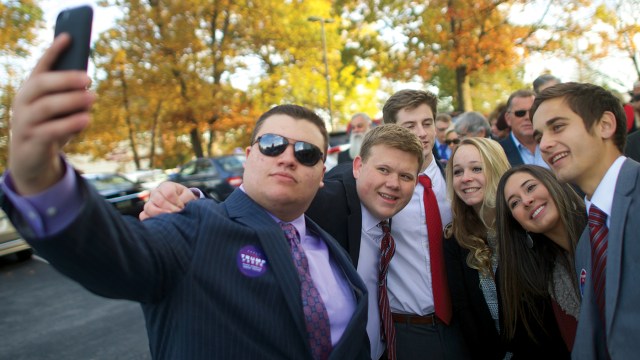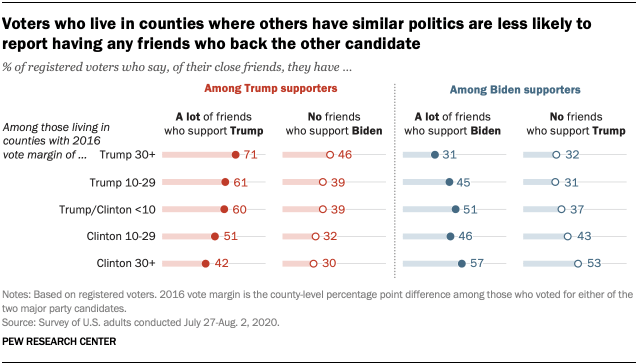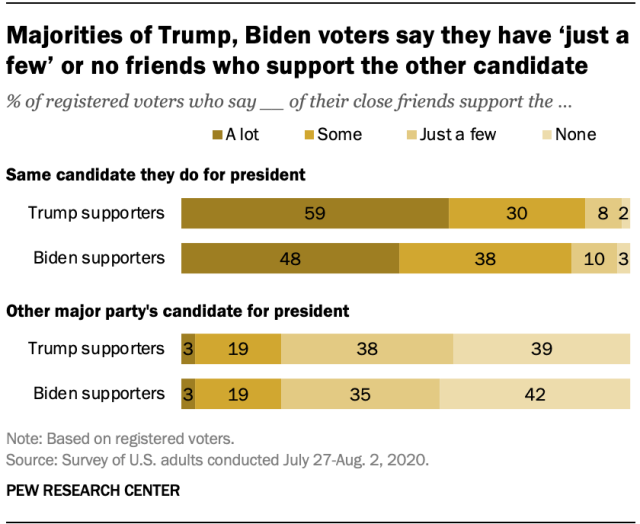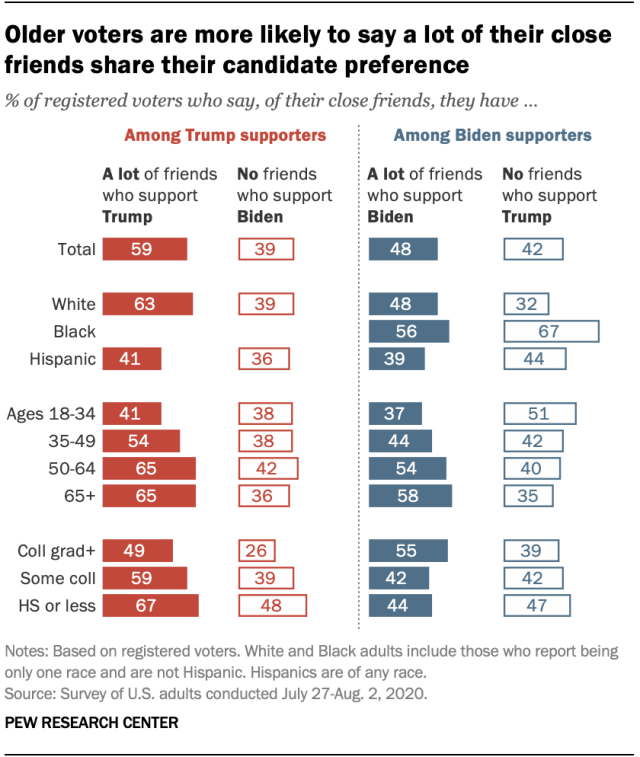
Supporters of Donald Trump and Joe Biden are divided not just in their views of the two presidential candidates and in their broader political beliefs and values. They are also largely divided in their personal relationships: Roughly four-in-ten registered voters in both camps say that they do not have a single close friend who supports the other major party candidate, and fewer than a quarter say they have more than a few friends who do, according to a Pew Research Center survey conducted in July and August.
Most voters instead report having a lot of friends who share their political preferences. Around six-in-ten Trump supporters (59%) say they have a lot of friends who share their support for the president’s reelection bid, while a slightly smaller share of Biden supporters (48%) say a lot of their close friends also back the former vice president in the election this fall. Nearly nine-in-ten backers of both Trump (89%) and Biden (87%) say they have at least some close friends who support their candidate for president.
Pew Research Center conducted this study to understand the personal networks of voters ahead of the 2020 presidential election. For this analysis, we conducted an online survey of 11,001 U.S. adults between July 27 and Aug. 2, 2020. Everyone who took part is a member of the Center’s American Trends Panel (ATP), an online survey panel that is recruited through national, random sampling of residential addresses. This way nearly all U.S. adults have a chance of selection. The survey is weighted to be representative of the U.S. adult population by gender, race, ethnicity, partisan affiliation, education and other categories. Read more about the ATP’s methodology. Here are the questions used for this report, along with responses, and its methodology.
Demographic differences
Trump supporters with a high school diploma or less education are more likely than those with more education to report having a lot of Trump-supporting friends: Two-thirds say this, compared with 59% of Trump supporters with some college experience and 49% of those with a college degree or more education. The pattern was similar, though less pronounced, in the summer of 2016. Trump voters without college experience are also more likely than those with a college education to say they have no friends who back Biden.
Among Biden supporters, those with a four-year college degree are somewhat more likely than those with less education to say they have a lot of friends who back Biden. But they are somewhat less likely to report having no Trump-supporting friends.
In both coalitions, older registered voters are more likely than younger voters to report having a lot of friends who back their candidate.
More than half of Black Biden supporters (56%) say they have a lot of close friends who support the Democratic nominee – little different than the 59% of Black voters supporting Hillary Clinton who said this in the summer of 2016.
Roughly half of White Biden supporters (48%) say they have a lot of friends who share their candidate preference, as do 39% of Hispanic Biden supporters. In the summer of 2016, Hispanic Clinton supporters were somewhat more likely than White Clinton supporters to say they had a lot of friends who backed Clinton (47% vs. 33%, respectively).
White Trump supporters are more likely than Hispanic Trump supporters (63% vs. 41%) to say a lot of their close friends also support the president.
Geographic differences
Trump supporters who live in counties that Trump won by a wide margin over Clinton in 2016 are more likely to say they have a lot of friends who also support the president – and more likely to say they have no friends who back Biden – than those who live in more politically mixed counties or counties that Clinton won in 2016.

In counties where Trump’s margin over Clinton was 30 points or more, 71% of Trump supporters say a lot of their friends currently support the president and nearly half (46%) say they have no close friends who back Biden. By comparison, in counties that Clinton won by a similarly wide margin, only 42% of Trump supporters say a lot of their friends back Trump and just 30% say none of their close friends support Biden.
The pattern is similar among Biden supporters: 57% of those who live in counties that Clinton won handily in 2016 say a lot of their close friends support Biden, while 53% say none of their close friends support Trump. But among Biden backers living in places that Trump overwhelmingly won in 2016, just 31% say a lot of their friends back Biden and only 32% say they have no close Trump-supporting friends.
Counties were classified according to the proportion of the two-party vote (i.e., excluding third-party candidate vote totals from the denominator), using county vote totals found in Dave Leip’s Atlas of U.S. Presidential Elections. For instance, “Trump by 30+” counties are those where Donald Trump received more than 65% of the two-party vote, while “Clinton by 30+” counties are those where Hillary Clinton received more than 65% of the two-party vote.
Respondents are classified into their counties using their exact address if available (99.5% of respondents). For the 0.6% of panelists without an exact address on file, panelists were matched with whatever geographic information was available (in most cases ZIP code). The 19 respondents (0.1% of the total sample) living in Alaska were categorized according to the state vote total as county vote totals are not available in Alaska.
Overall, a quarter of Americans live in counties that Clinton won by 30 percentage points or more in the 2016 election, and slightly fewer (21%) live in counties that Clinton won by 10 to 29 points. Two-in-ten Americans live in counties won by Trump by 30 points or more, and 16% live in counties Trump won by 10 to 29 points. About two-in-ten Americans live in counties where either Trump or Clinton won by less than 10 points.
Note: Here are the questions used for this report, along with responses, and its methodology.





